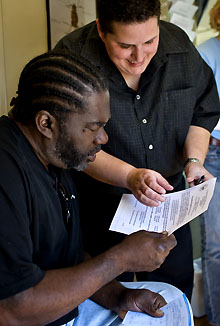New Training for Community Health Workers
When it comes to staying healthy, sometimes check-ins are as important as checkups. That's the philosophy behind a new Tulane University School of Medicine program that aims to train community health workers to provide health education and act as liaisons between patients and their doctors or social services providers.

Outreach to New Orleans patients such as George McClain, left, receiving diabetes treatment at a Tulane mobile clinic, will be increased by the training of community health workers. (Photo by Paula Burch-Celentano)
These advocates check in with patients to make sure they're following doctors' orders and properly taking their medications, for example, and can even help them access social services to address any barriers to keeping themselves healthy.
Using a $250,000 federal grant, Tulane is partnering with RAND Corp. to start the Tulane RAND Community Health Worker Training Institute. It will offer residents who have at least a high school diploma a formal, 120-hour training course in health outreach, patient care coordination and health advocacy. A pilot class begins Feb. 1, says Ashley Wennerstrom, senior program manager for the Tulane Office of Community Affairs and Health Policy.
“Trained community health workers are important, and often underutilized, members of healthcare teams. They provide education, link hard-to-reach populations with health and social services, and advocate for individual and community health needs,” Wennerstrom says. “The institute fills a vital niche in our region by supporting critical workforce development for community health workers while increasing knowledge and research about how they can contain healthcare costs, improve public health and increase post-disaster community resilience.”
The grant was funded by legislation sponsored by U.S. senators Mary Landrieu and David Vitter, U.S. Rep. Steve Scalise and former congressmen Charlie Melancon and Anh “Joseph” Cao.
Wennerstrom is working with community groups in the New Orleans area to design the curriculum to their needs. Graduates will be able to work for community health centers, clinics, hospitals, health departments and nonprofit organizations.
Local community organizations may nominate students to participate or members of the public interested in enrolling can contact Wennerstrom at 504-988-4007.
